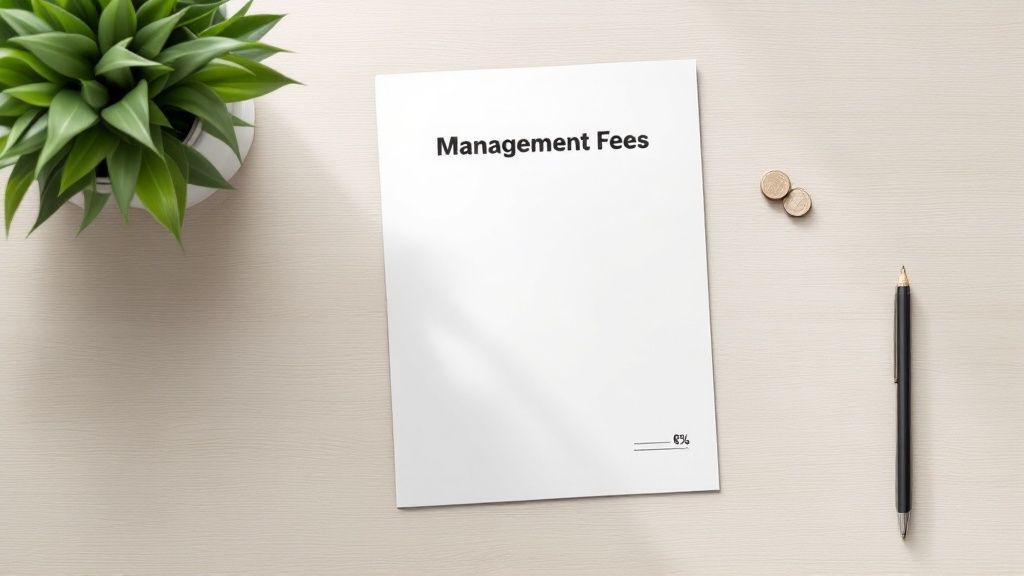Choosing a property management company is a pivotal decision for any real estate investor. The right partner transforms your property into a passive, profitable asset; the wrong one creates financial strain and operational chaos. To choose wisely, you must ask targeted questions that reveal a company's true competence.
This guide provides a definitive list of the essential questions to ask a property management company. These aren't generic queries. Each one is designed to be a diagnostic tool, helping you uncover a firm's operational effectiveness, transparency, and commitment to your investment's success.
By asking these pointed questions, you gain the actionable insights needed to vet potential partners thoroughly. This process equips you to select a management team that not only protects your investment but actively enhances its value and maximizes your returns. We will cover everything from their fee structures and tenant screening protocols to their maintenance procedures and communication technology. Let's begin the vetting process.
1. What are your management fees and pricing structure?
Understanding the complete fee structure is the critical first step. This question goes beyond a simple percentage; it’s about uncovering every potential cost associated with managing your investment. A transparent answer signals a trustworthy partner, while vague responses often hide future fees that will erode your profits. This question helps you accurately forecast net operating income and avoid costly surprises.

The answer will likely involve one of a few common models. This is one of the most vital questions to ask a property management company because it directly impacts your bottom line and sets the financial foundation for your partnership.
Common Pricing Models to Compare
Most companies use a combination of a base management fee plus other charges. Your goal is to understand the total cost.
- Percentage-Based Fee: The most common model, where the company charges a percentage of the monthly collected rent, typically 8-12%. Example: A company charges a 10% monthly fee plus a one-time tenant placement fee of $300.
- Flat-Fee Model: A straightforward approach where the company charges a fixed dollar amount per unit each month, regardless of the rent. Example: $100 per unit per month.
- All-Inclusive vs. A La Carte: Some "full-service" firms might charge a higher percentage (e.g., 12%) but include services like tenant placement and lease renewals. Others charge a lower base rate (e.g., 8%) but add separate fees for these services.
Actionable Tips for Evaluating Fees
Key Insight: The cheapest option is rarely the best. A low monthly fee can be offset by high tenant placement fees, maintenance markups, or lease renewal charges. Focus on the total annual cost, not just the base rate.
- Request a Complete Fee Schedule: Ask for a written document detailing every potential charge, from the monthly management fee to eviction coordination fees.
- Clarify "Collected Rent": Does the management percentage apply to all rent collected or only rent collected while the unit is occupied?
- Inquire About Volume Discounts: If you have multiple properties, ask if they offer a reduced percentage for a larger portfolio.
- Uncover Maintenance Markups: Ask if they add a surcharge to vendor invoices for maintenance. A 10-20% markup is common, but it must be disclosed upfront.
By dissecting the fee structure, you can compare companies accurately and select a partner whose pricing aligns with your strategy. For a deeper dive into how different pricing models can affect your portfolio, explore these detailed property management pricing insights to make a more informed decision.
2. How do you handle tenant screening and placement?
Placing a high-quality tenant is the most effective way to protect your asset and ensure consistent cash flow. This question probes a company's process for attracting, vetting, and securing reliable renters. A thorough screening process minimizes risks like late payments, property damage, and evictions. A company’s answer reveals its commitment to protecting your investment from day one.

A robust tenant placement strategy is more than a credit check; it's a system designed to find a responsible tenant who will treat your property with respect and stay long-term. This is a critical question to ask a property management company because tenant quality directly determines your success.
Common Screening Processes to Compare
A comprehensive screening process should be standardized and compliant with Fair Housing laws. Look for companies that go beyond the basics.
- Standard Vetting: Most companies check credit scores, criminal backgrounds, and eviction histories. Example: Requiring a minimum 650 credit score, income of 3x the rent, and no prior evictions.
- Enhanced Vetting: Top-tier companies dig deeper. They verify employment, contact previous landlords, and may even check public records. Example: A firm that offers a 30-day placement guarantee backed by a multi-point verification process.
- Tenant Guarantees: Some companies stand by their screening by offering a placement guarantee. Example: If a tenant they place is evicted within the first 12 months, they will find a replacement for free.
Actionable Tips for Evaluating Screening
Key Insight: A low vacancy rate is meaningless if it's filled with bad tenants. Prioritize a company's screening rigor over its placement speed. The goal is the right tenant, not just any tenant.
- Ask for Their Written Criteria: Request a copy of their standard tenant qualifying criteria to ensure their process is consistent and non-discriminatory.
- Inquire About Tenant Retention Rate: A high retention rate (e.g., over 75%) indicates good tenant screening and effective management.
- Clarify Vacancy Timelines: Ask for their average "days on market" for a vacant unit. This helps you understand how quickly they can turn a property around without sacrificing quality.
- Understand Who Pays: Confirm if the screening fee is paid by the applicant (the industry standard) or if it's a cost passed on to you.
By scrutinizing their tenant screening procedures, you can gauge a company's ability to protect your investment and secure a reliable income stream.
3. What is your maintenance and repair process?
Property maintenance directly impacts tenant satisfaction, property value, and your long-term ROI. This question examines how a company handles routine work, emergency repairs, vendor management, and cost control. A proactive maintenance process protects your asset and retains good tenants, while a disorganized approach leads to deferred maintenance and high turnover.

The answer reveals the company's operational efficiency and commitment to preserving your investment. This is one of the most crucial questions to ask a property management company, as maintenance influences both daily expenses and the property's future market value.
Common Maintenance Systems to Look For
A modern property management company should have a technology-driven system for handling maintenance requests efficiently.
- In-House vs. Third-Party Vendors: Some companies use their own maintenance staff for routine jobs, which can be cost-effective. Others rely on a network of vetted third-party contractors for specialized work. Example: A company uses an in-house handyman for minor fixes but calls a licensed HVAC specialist for furnace repairs.
- Technology-Driven Portals: Leading companies provide online portals where tenants can submit maintenance requests and track their status. Example: Tenants can log in, upload a photo of the issue, and receive real-time updates from submission to completion.
- 24/7 Emergency Response: This is non-negotiable. The company must have a clear protocol and dedicated contact for after-hours emergencies like burst pipes or electrical failures. Example: A 24/7 emergency hotline with a guaranteed two-hour response time for critical issues.
Actionable Tips for Evaluating Maintenance Processes
Key Insight: A company's preventative maintenance plan is as important as its emergency response. Proactive inspections prevent small issues from becoming expensive disasters.
- Request a List of Approved Vendors: Ask to see their list of preferred contractors and inquire about their vetting process, insurance requirements, and pricing.
- Clarify Cost Approval Thresholds: Understand how much they can spend without your direct approval ($250? $500?). This should be clearly stated in the management agreement.
- Define "Emergency": Ask for their specific definition of what constitutes an emergency versus a non-urgent repair to understand their prioritization process.
- Ask for a Preventive Maintenance Schedule: Inquire if they perform regular inspections (e.g., semi-annually) and what items they check, such as smoke detectors, HVAC filters, and signs of leaks.
4. How do you handle rent collection and late payments?
Consistent and timely rent collection is the lifeblood of your investment. This question evaluates the company's systems for ensuring payments are on time and their protocol for managing delinquencies. A proactive, systematic approach indicates a professional operation, while a lenient process can quickly lead to financial losses.

The answer should detail their entire process, from payment options to the specific steps taken when rent is late. Asking these questions to a property management company reveals their efficiency, legal compliance, and commitment to protecting your revenue.
Common Rent Collection and Delinquency Protocols
A professional firm will have a legally compliant process that is firm but fair, combining modern technology with established procedures.
- Online Payment Portals: The industry standard. Offering tenants easy online payment options via ACH or credit card significantly increases on-time payments. Example: A company achieves a 98% on-time payment rate after implementing a tenant portal with automated reminders.
- Automated Late Fee System: Policies should be enforced automatically and consistently. The system should assess and communicate late fees as soon as the grace period expires.
- Structured Communication: A clear timeline of communication for late payments, starting with automated reminders, followed by personal calls, and culminating in formal "Pay or Quit" notices.
Actionable Tips for Evaluating Collection Policies
Key Insight: A strict, well-documented collection policy benefits everyone. It sets clear expectations for tenants and protects your investment by treating rent collection as a business process, not a negotiation.
- Ask for Their On-Time Collection Rate: A high rate (95% or better) is a strong indicator of an effective system.
- Review Their Late Fee Policy: Understand how much they charge, when it is applied, and if you, the owner, receive a portion of that fee.
- Clarify the Eviction Process: Who handles evictions? Who pays the legal fees upfront? Do they use an in-house team or a preferred attorney?
- Inquire About Payment Turnaround: After they collect rent, how quickly is it processed and deposited into your account? A turnaround of 5-10 business days is standard.
By scrutinizing their rent collection procedures, you can gauge a company's ability to maintain the financial health of your property.
5. What technology and reporting do you provide?
Technology is the backbone of efficient property management. This question probes the software and digital tools a company uses to streamline operations, communicate, and provide clear financial insights. A company that invests in modern technology demonstrates a commitment to efficiency, accuracy, and providing you with on-demand access to your investment's performance.
The answer reveals how easily you'll be able to access information and how effectively the company operates. This is one of the most important questions to ask a property management company because their tech stack directly impacts your experience as an owner.
Common Technology Platforms to Know
A manager’s software impacts everything from rent collection to owner reporting. Look for established, industry-specific platforms.
- All-in-One Software Suites: Top firms often use platforms like AppFolio, Buildium, or RentManager. These integrate accounting, maintenance, screening, and owner/tenant portals. Example: They use AppFolio, which allows tenants to pay rent online and owners to view monthly statements through a dedicated portal.
- Specialized Communication Tools: Some companies may use dedicated apps or portals for communication, separating it from the main management software.
- Integrated Accounting: A key feature is the ability to sync financial data with professional accounting software, ensuring accurate bookkeeping.
Actionable Tips for Evaluating Technology
Key Insight: Don’t just ask what software they use; ask for a live demonstration of the owner portal. An intuitive portal that gives you real-time access to financials is a sign of a transparent manager.
- Request an Owner Portal Demo: Ask them to walk you through their owner portal. Can you easily find income statements, see maintenance invoices, and access lease documents?
- Inquire About Tenant-Facing Tech: How easy is it for tenants to pay rent or submit a maintenance request online? A smooth tenant experience leads to higher retention.
- Clarify Reporting Frequency and Detail: Ask for a sample owner statement. Will you receive reports monthly? Do they include a balance sheet, income statement, and a general ledger?
- Understand Data Security and Backup: How is your and your tenants' sensitive data protected? What are their procedures for data backup and system recovery?
By evaluating a company's technology, you can ensure you have the transparency needed to oversee your investment effectively. For a look at how technology can streamline rental management, you can explore the features offered by platforms like AppFolio to understand what to expect from a leading provider.
6. How many properties do you manage and what is your local market experience?
A company's portfolio size and local expertise impact their ability to manage your property effectively. This question helps you gauge their operational capacity, market knowledge, and whether they can provide personalized attention. A firm that is too small may lack robust systems, while one that is too large might treat you like a number.
Finding the right balance is key. You want a partner with enough experience to handle any situation but not so large that your property gets lost. This is a crucial question to ask a property management company because it reveals their ability to set competitive rents, attract qualified tenants, and navigate local regulations.
Common Company Sizes and What They Offer
The size of a management company often dictates its service model. Align their strengths with your property's needs.
- Boutique Firms (50-200 units): Often provide highly personalized service and may specialize in a specific niche. Example: A local firm managing 150 single-family homes exclusively in two high-demand suburbs.
- Regional Players (200-1000+ units): Typically have well-established systems, a broader vendor network, and significant data on local market trends. Example: A company managing 800 units across a metro area, offering sophisticated owner portals and detailed financial reporting.
- Large National Firms: Leverage vast resources but can sometimes lack nuanced understanding of a hyper-local market. Their success depends on the quality of the local team.
Actionable Tips for Evaluating Experience
Key Insight: The number of properties is less important than the ratio of properties to staff. A well-staffed company with 500 properties may provide better service than an under-resourced firm with only 100.
- Ask About Staff-to-Property Ratios: How many properties does each individual manager oversee? A ratio of 25-40 properties per manager often indicates attentive service.
- Request Local Market Data: Ask them to provide a rental analysis for your specific property. Their ability to cite comparable rentals and justify their pricing shows true local expertise.
- Inquire About Staff Longevity: High staff turnover can lead to inconsistent service. Ask about the average tenure of their property managers.
- Verify Experience with Your Property Type: Ensure they have a proven track record of successfully managing properties similar to yours (single-family, multi-family, condo, etc.).
By digging into their portfolio size and local knowledge, you can determine if they have the right combination of scale and expertise. For more strategies on vetting potential partners, you can explore additional insights on the FlipSMRT real estate blog.
7. What are your contract terms and cancellation policies?
Signing a management agreement is a significant commitment, so understanding the contract terms and your exit options is non-negotiable. This question probes the legal framework of your partnership, including contract length, termination clauses, and performance guarantees. A company with fair, clear terms demonstrates confidence in its service, while one with rigid, punitive policies is a red flag.
The contract dictates the rights and responsibilities of both parties. This is a critical question to ask a property management company because it provides an escape route if the service fails to meet expectations, giving you crucial control over your asset.
Common Contract Structures to Compare
Management agreements vary in duration and flexibility. It’s vital to understand what you're committing to.
- Annual Contracts: The most common structure. These agreements typically last for one year and may include a penalty for early termination. Example: A 12-month contract that requires a 60-day notice and a fee equal to one month's management fee to cancel early.
- Month-to-Month Agreements: Offers maximum flexibility, allowing either party to terminate with short notice (usually 30 days) without a penalty. Example: A rolling agreement with a 30-day written notice requirement for cancellation.
- Contracts with Performance Guarantees: These allow you to exit without penalty if the company fails to meet specific metrics. Example: A clause allowing termination if the property remains vacant for over 60 days.
Actionable Tips for Evaluating Contracts
Key Insight: A company's willingness to offer flexible terms or performance guarantees reflects their confidence. Don't be afraid to negotiate terms before signing; a good partner will work with you.
- Request a Sample Agreement: Always review the full contract before making a decision. Pay close attention to the termination, fees, and responsibilities clauses.
- Clarify Termination Procedures: Ask for the exact process to terminate the contract: notice period, costs, and contact person.
- Look for Remedy Clauses: A good contract outlines what happens if the management company fails to perform, such as fee waivers or the right to terminate without penalty.
- Understand Property Transition: Ask how they handle the transfer of documents, keys, and security deposits to you or a new manager upon termination.
By carefully examining the contract, you ensure your interests are protected. For a more detailed breakdown of what to look for, you can review these common property management contract terms to better prepare for your review.
8. Can you provide references and examples of your track record?
A company's past performance is the most reliable predictor of future service. This question cuts through marketing claims and asks for tangible proof of expertise and client satisfaction. A confident company will readily provide references, case studies, and performance data. Reluctance to produce this evidence is a major red flag.
Reviewing a company's track record helps you verify their claims and understand their real-world operational style. This is an essential question to ask a property management company because it provides social proof and hard data to support your decision.
Types of Proof to Request
A strong track record is more than just a few positive quotes. Look for a combination of qualitative feedback and quantitative results.
- Direct Client References: Contact information for current or former property owners. Example: Speaking with a current client who can attest to a 95% occupancy rate over the last three years.
- Performance Case Studies: Detailed examples of how they improved a property's financial performance. Example: A case study showing how they decreased operating expenses by 15% and increased rental income by 10% for a struggling property.
- Online Reviews and Ratings: Third-party validation on platforms like Google, Yelp, or the Better Business Bureau.
Actionable Tips for Verifying a Track Record
Key Insight: Don't just rely on hand-picked references. Do your own independent research by checking online reviews and asking for a list of all properties they manage to see their work firsthand.
- Ask Specific Questions: When speaking with references, ask about communication, financial reporting timeliness, and how the company handled a specific tenant or maintenance challenge.
- Inquire About Client Longevity: Ask about the average length of their client relationships. Long-term clients often signal consistent, high-quality service.
- Check Their Digital Footprint: Look for a professional online presence and read reviews on multiple platforms to identify any recurring complaints.
- Request Performance Metrics: Ask for data on their average vacancy rates, time to fill a vacancy, and rent collection rates across their portfolio.
By thoroughly investigating a company's history and speaking with those who have experienced their service, you can build confidence that you are choosing a proven, reliable partner.
8 Key Questions for Comparing Property Management Companies
| Aspect | Management Fees and Pricing ⭐🔄📊💡 | Tenant Screening and Placement ⭐🔄⚡💡 | Maintenance and Repair Process ⭐🔄⚡📊💡 | Rent Collection and Late Payments ⭐🔄⚡📊💡 | Technology and Reporting ⭐🔄⚡📊💡 | Local Market Experience and Portfolio ⭐🔄📊💡 |
|---|---|---|---|---|---|---|
| Implementation Complexity 🔄 | Medium complexity due to varied fees and structures | Moderate complexity with detailed screening steps | High complexity managing vendors and 24/7 response | Moderate complexity with multi-step collection and legal | Medium complexity integrating multiple digital systems | Low to medium, depends on company size and local knowledge |
| Resource Requirements ⚡ | Requires clear fee documentation and billing systems | Needs access to screening tools and databases | Requires vetted contractors and maintenance teams | Needs payment processing platforms and legal expertise | Requires robust online platforms and mobile applications | Requires experienced staff and local vendor relationships |
| Expected Outcomes 📊 | Transparent budgeting, cost control, potential savings | Quality tenants, reduced vacancy risk | Prompt repairs, high tenant satisfaction | Consistent rent flow, reduced delinquency | Real-time data, streamlined operations | Effective management, market-aligned strategies |
| Ideal Use Cases 💡 | Comparing service value and negotiating fees | Minimizing risk with tenant quality screening | Ensuring property upkeep and quick issue resolution | Maintaining cash flow and legal rent enforcement | Owners valuing transparency and efficiency | Owners seeking tailored local expertise and scale benefits |
| Key Advantages ⭐ | Clear cost expectations, fee negotiation leverage | Reduced problem tenants, faster placements | Professional vendors, preventive maintenance | Improved payment rates, legal risk reduction | Automation reduces errors, enhances communication | Local insights, vendor access, scalable property management |
Making Your Final Decision with Confidence
Navigating the landscape of property management companies is a crucial test of your investment strategy. You are now armed with a powerful list of questions to ask a property management company—tools designed to probe the core of their operations. A great partner doesn't just collect rent; they protect and grow your asset.
As you review the answers, the right choice will become clear. It's the company whose fee structure felt transparent, not confusing. It's the team whose tenant screening process is rigorous and data-driven. Their approach to maintenance should be proactive and preventative, not a reactive model that erodes your profits.
Synthesizing the Data for a Clear Choice
Choosing a property manager is a strategic partnership. Don't focus on a single data point. Instead, weigh the answers collectively to form a complete picture of how each company operates and aligns with your investment goals.
Consider these final checkpoints:
- Alignment of Values: Does their communication style match your preference? If you value detailed monthly reports, a manager who prefers a quick phone call may not be the best fit.
- Technological Edge: Did their reporting and technology solutions impress you? Modern systems are a sign of a forward-thinking company that values transparency and excellence.
- Local Market Mastery: How confident were you in their understanding of your specific neighborhood? True local expertise means they can set competitive rents, market effectively, and anticipate regional challenges.
The answers to the questions to ask a property management company are your raw data. Your final task is to analyze this information to find the partner who will act as a true steward of your investment, maximizing its potential and giving you peace of mind. This diligent vetting process separates successful, hands-off investors from those who end up micromanaging their manager.
Before you hand over the keys, ensure the property itself is a winner. Maximize your portfolio's potential by starting with the right numbers. Flip Smart offers a powerful suite of tools to analyze rental properties, forecast cash flow, and estimate renovation costs, ensuring every investment is backed by solid data. Make your next acquisition your best one by visiting Flip Smart and turning smart analysis into profitable reality.
Article created using Outrank
